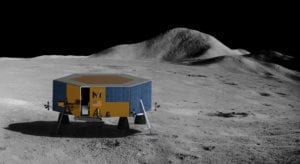
On 6 April 2020, US President Donald J. Trump signed an Executive Order (EO) on Encouraging International Support for the Recovery and Use of Space Resources. This order addresses US policy regarding the recovery and use of resources in outer space, including the Moon and other celestial bodies. Over the next few weeks, SpaceWatch.Global will publish a range of perspectives supporting and opposing the EO from experts around the world. Today’s two expert perspectives come from Michael Listner of the United States (below) and Elina Morozova of Russia (see here).
In your opinion, what is the underlying strategic and economic rationale for President Trump’s Executive Order?
The U.S. is taking the lead in developing outer space law and policy but pursuing it from the bottom-up as opposed to top down. It’s critical to understand the tenor of the E.O. does not anticipate the U.S. to be the sole participant or conquering outer space as being brandished by the Russian Federation but rather setting the foundation for what the rule of law will and encouraging other states to participate. The E.O. appears to be intended to gain international support for space resource activity as espoused by the U.S., form partnerships and create an acceptable and workable legal environment, including norms of behavior, to facilitate space resource activities. The E.O. is also intended to make the idea of space resources workable and establish legal certainty that will in turn encourage investment to develop the technology and techniques to acquire space resources. Understand, this is the first step to circumnavigate top down approaches and make space resources a viable concept to coincide with the planned U.S. return to the Moon, which will lead to commercial activity and the development of a cis-lunar economy.
The Executive Order explicitly rejects the 1979 Moon Agreement. How do you think this will be received by other countries, particularly other major space powers?
There are 18 states that ratified and acceded to the Moon Agreement, which does not include the U.S., the Russian Federation or the People’s Republic of China (PRC), and makes it questionable international law at best. Parties to the Moon Agreement will certainly not be pleased with this development as the formal denouncement of the Moon Agreement and its effect on custom effectively makes it of no value in the structure of international law and will likely discourage other states who might be considering acceding to it. As for the other two space powers, beyond what soft power benefit it will give them in the United Nations and other international legal forums, there can be little condemnation as neither has accepted the Moon Agreement, which means beyond making political noise any push back will have little meaning.
Similarly, the Executive Order explicitly rejects the view that space is a Global Commons. What, in your opinion, is the policy rationale behind this claim and, again, how do you think this will be received by other countries?
“Global commons” in terms of international law infers terrestrial environments. To say outer space is a global common means it is a terrestrial environment akin to the oceans, the skies, Antarctica, etc. That isn’t the case as outer space and celestial bodies are decidedly not terrestrial, which makes the outer space domain unique not only from its physical attributes but the way it is treated legally as well. That is to say, while outer space can be compared to terrestrial domains in some respects, it is extraordinary and not a one-to-one comparison to the terrestrial environment, including how it should be treated legally. The U.S. position is not popular and states and international bodies that favor top-down approaches consider outer space as a global commons, which supports strict interpretations of the Outer Space Treaty and the legal foundation of the Moon Agreement. The U.S. position, which you noted has been articulated as policy prior to this Administration, provides a policy foundation that permits the U.S. to interpret the Outer Space Treaty to support the concept of space resources and provide a policy foundation to reject the Moon Agreement and it “common heritage of all mankind” language as applied to outer space. In other words, if the U.S. recognized outer space as a global commons, it would essentially be implicitly acknowledging the common heritage language in the Moon Agreement and would not provide the necessary policy foundation to reject the accord nor would it permit an interpretation of the Outer Space Treaty that supports space resources.
In your view, how likely will this Executive Order “encourage international support for the public and private recovery and use of resources in outer space…?”
It is not out of the realm of possibility. The tenor of the E.O. is set in Section 2 where it asserts U.S. citizens “…should have the right…” as opposed to expressly asserting the right exists. This creates a perception the door is open to dialogue and conversation as opposed to going it alone, which makes the prospect of encouraging other states to engage and accept the idea of space resources viable. Certainly, Luxembourg’s acceptance of space resources in its domestic laws and the UAE’s acceptance are harbingers of other states passing their own measures. On the other hand, there will be push back on the U.S. approach from states like the Russian Federation who are not supportive of commercial activities in outer space, those who support top-down initiatives like the Building Blocks and in COPUOS.
Hypothetically assuming that this Executive Order leads to international support, will it make the prospect of commercial space resource extraction closer to reality?
The initiative has a good chance of succeeding depending on how flexible it is in its approach. That isn’t to say there won’t be bumps in the road along the way, but compared to top-down measures that deal with resources like UNCLOS, pulling together a coalition of state-level stakeholders might be attainable and would encourage others to join. Of course, it will become real when a private entity actually extracts resources whether in-person or remotely through robotics and lays claim to the fruits of their efforts. When that happens, speculation becomes reality whether an understanding or framework is ready or not.

Michael Listner is an attorney and the founder and principal of Space Law and Policy Solutions, a think tank and consultation firm that concentrates on legal and policy matters relating to outer space security, industry and development. Michael holds a Bachelor of Science (B.S.) in Computer Information Systems from Franklin Pierce University and obtained his Juris Doctorate (J.D.) from Regent University School of Law, and he is a member of the New Hampshire Bar.
 SpaceWatch.Global An independent perspective on space
SpaceWatch.Global An independent perspective on space




